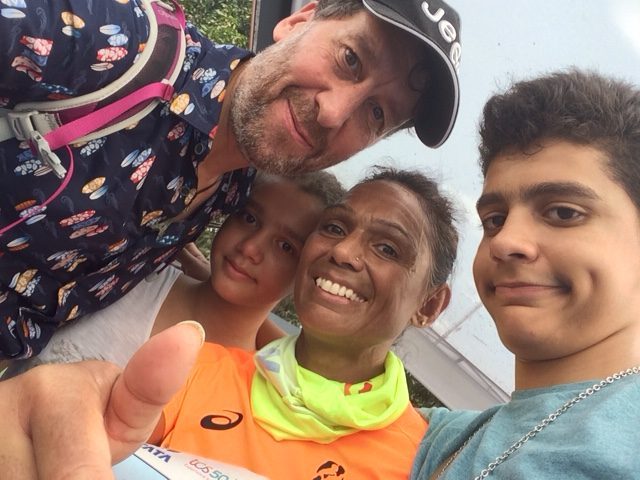‘It takes a village to raise a child,’ says the African proverb, conjuring a colourful picture of childrearing as communal activity—a process to which, over time, many people contribute, some with blood ties, others not.
Of course, the principle is universal. It is not exclusive to African children and even as adults we remain dependent on the help, support and influence of others as we grow and chase our goals. Our seemingly individual achievements are themselves ‘crowd-funded’.
On Sunday, my wife Munni ran her first full marathon. She joined around 46,000 runners in the Tata Mumbai Marathon (including the participants in the half marathon, 10 km and 6 km fun run). The 42-km route begins in the south of the city under the spot lit gothic splendour of Chhatrapati Shivaji Terminus and weaves north to Bandra, the so-called Queen of the Suburbs.
It’s the one day of the year when runners can cross on foot the iconic Bandra-Worli Sealink a 5.6-km bridge that joins the Maximum City’s western suburbs to south Mumbai. Our children, Milan (12) and Maya (11), and I were there to roar our support as she turned at the midway point and headed back south to deal with the punishing prospect of Peddar Road—a long uphill haul at around 36 km. The kids and I jumped on the train to Marine Lines to cheer her as she pushed her exhausted legs along the gracious sweep of Marine Drive and willed her on through the pain towards the finishing line.
A marathon is a massive achievement; a bucket list scalp, only gained with months of tough training, exercise and disciplined eating. I’ve seen what a life-affirming, confidence-boosting, libido-enhancing activity it is for a woman in her early fifties as the ab-shaping, butt-firming, strength-building endurance schedule takes effect. She is a woman transformed mentally and physically.
It’s her success. She owns her win. But it’s one that Milan, Maya and I are claiming some credit for. We’ve not put in the hard, sometimes lonely miles—though I’ve paced her on a few of occasions and we’ve run together a couple of the 21 km half marathons included in the training programme. But we’ve made other contributions.
We’ve had to adjust our routines and take up the slack in other areas of life, so she can sleep early and set a 5-am alarm to pound the pre-dawn pavements, dodging the street dogs and navigating the sidewalks of Bandra, Mahim, Shivaji Park, and Worli Seaface before returning to embark on a full day’s work as the boss of a creative agency. The children have learned how to use the washing machine and wash the dishes and become less reliant on mummy when getting ready for school. They now walk to the bus stop on their own on weekday mornings while Munni does core exercises and they make eggy weekend breakfasts when she returns from the weekly long-distance run. I’ve stepped up to take charge of the kitchen and a greater share of domestic chores.
She has been disciplined and committed and resigned to missing out on family functions and friends’ parties in order to stick to her tightly calibrated regime. I know she’s felt guilty about her absences. Sometimes she’s struggled to make time for the rest of us. On occasions we’ve fought a losing battle as she lost herself in running blogs and WhatsApp chats with new friends with whom she has a shared interest but whose world we are not part of. Harsh words have been spoken and regretted.
I’ve come to recognise that others too are part of the ‘village’ without whose help and encouragement the feat wouldn’t have been accomplished. We’ve compromised, shared her ambition, encouraged her through injuries and the psychological battles and celebrated each new milestone.
She’s been a magnificent role model showing our children, her colleagues and family members what can be achieved with planning, grit and the support of a family fully committed to her success. We are proud teammates of a superstar ‘marathon mum’ and wonderful wife. For the next week or so we’ll be disabling her alarm, hiding her phone, letting her rest and living in the reflected glory of her success.


